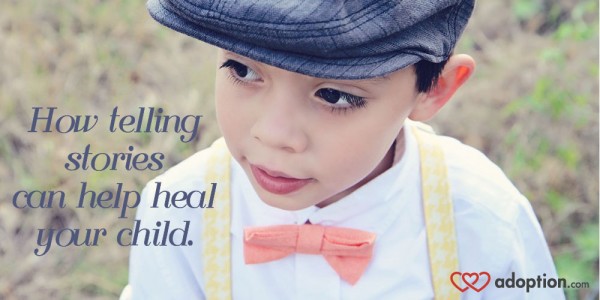When Alex was almost 5 years old, he was constantly telling stories.
He had been home with us for two years, and though he had very few complete memories of his life before our home, the trauma of what he and his twin brother endured in their early life had an impact. For many months, he suffered from night terrors: almost nightly at first, but less and less as time went on. Even after his adoption, despite our reassurances, he was scared that he would one day have to leave.
He started telling stories to me at bedtime, using the same kind of grown-up inflection that he heard us use when reading to them. Some were funny, some were tragic, and they all seemed to speak to something he was trying to make sense of. For instance, around the time of his adoption, he asked to be told the story of his first night in our home as our foster children and would add details about the judge and where he lived (by a tall mountain), and why he decided on us to take care of Alex and Art (because we had lots of cereal and two dogs, and those things are important). Despite wishing otherwise, I didn’t have good answers for him when he wondered where his birth family lived or what they did each day, so he would tell me that they lived at the beach and went to the zoo.
We were sure to gently specify which parts were truth and which parts were imagination, and he was always able to delineate the two. It isn’t uncommon to hear about children who are adopted making up stories to fill in holes, so we wanted to be sure he understood the difference between reality and fiction while allowing him to explore his own story creatively. His stories were healing. They helped him make sense of something that seemed senseless.
Once, in the car, he told a story that felt so confident. My hopes and prayers for him to have peace were bolstered. I started the recorder on my phone and got as much as I could of his sweet tale:
Mom, let me tell you about when we were growing up.
Me and my brother were babies and we had a bath in a sink.
When we were one, we turned two.
When we were two, we rode some horses, and they were very nice.
When we were three, we started building roads.
When we were four, we built some houses. We built so, so many houses.
When we were five, we built a whole city and we were the boss.
When we were six, we planted some trees in the city and there were birds.
When we were seven, we made big, big, big, BIG towers up to the sky.
When we were eight, I colored a picture of mommy & daddy & Maggie & Mary & a rainbow.
Then we were nine, and we were all alone. I built a new house that was tiny, and I put the picture inside and I put on the lid.
When we were ten, then we could drive a car, and we drove to the store to buy candy and marshmallows, and we ate and ate them. We were grown-up and we could drive to the zoo.
Then we didn’t want to be alone, so did some magic to make the picture real. We put magic stuff on top of the house, and then it made you real, Mommy. And Daddy was real and Maggie and Mary was real and not a picture anymore.
And I just didn’t want to drive to the store anymore. So I became a little boy again, to have a mommy and daddy and be a family with you.
Now at 6 years old, he still needs reassurance at times. But slowly, we have been given the beautiful privilege to watch him gain confidence in his place in the world. He knows adoption is forever and that he is an important part of our family. He rarely has nightmares. His stories are almost all sheer silliness.
He knows our family is real, and we always will be.
Has anyone else helped a child work through tough feelings creatively? What have you done to encourage imagination while being sure he or she knows what is true and what is pretend?

